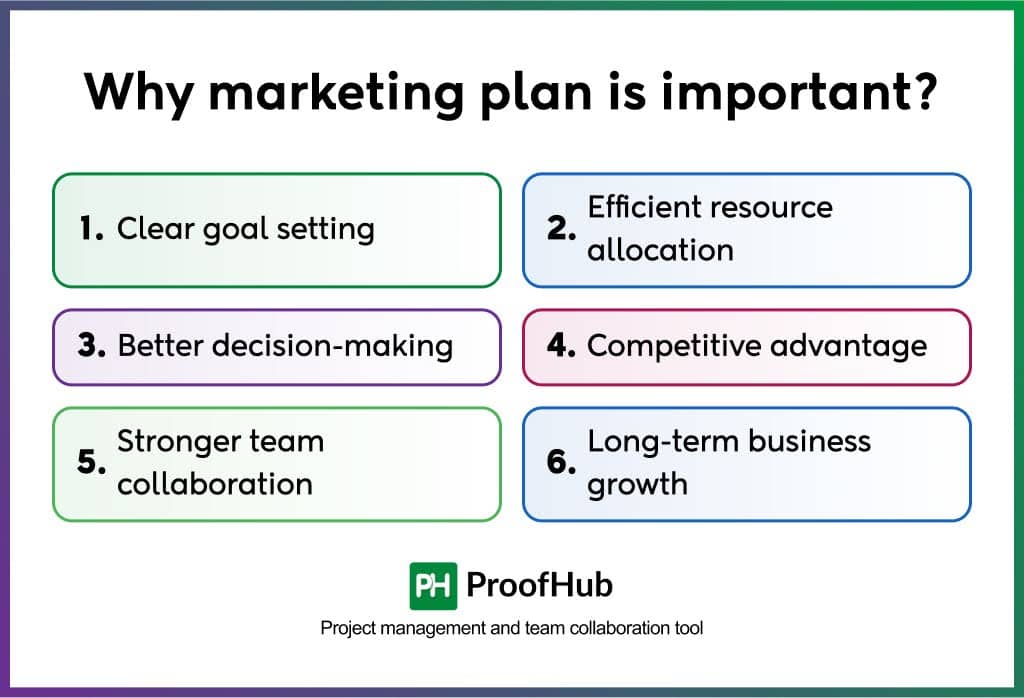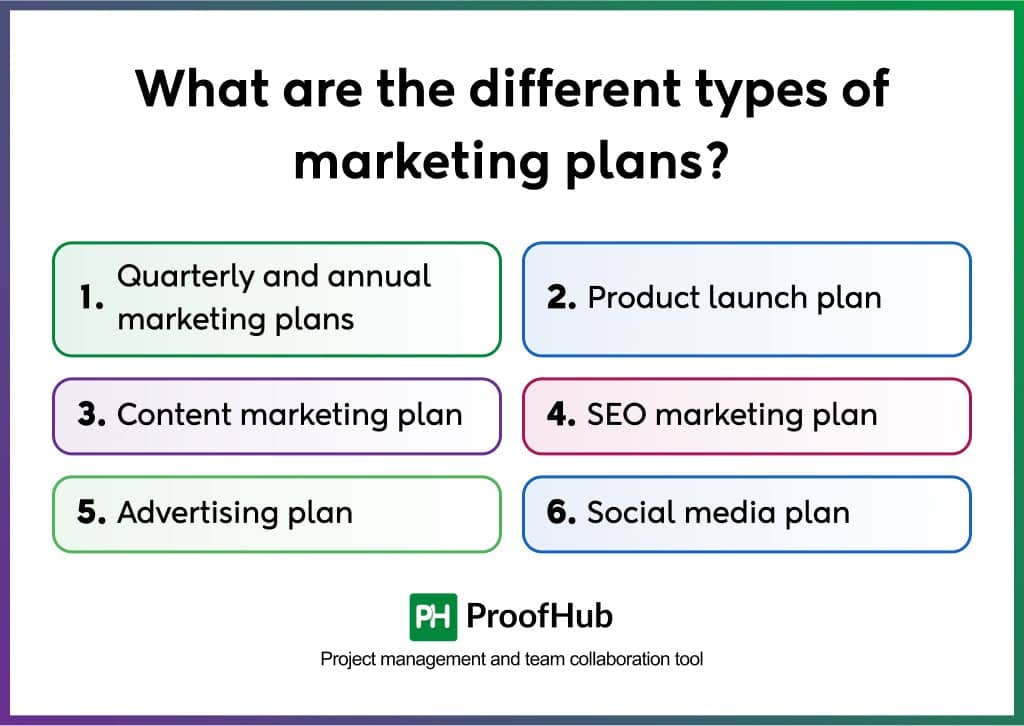Introduction
Marketing is one of the biggest expenses for any business. When it is done in the right way, it can deliver great results. To build a successful business, you need a good marketing plan to promote your products and services.
In other words, a marketing plan with clear goals and objectives makes it easier for businesses to connect with the target audience with ease.
So, if you want to leave an ever-lasting impression on the target customers and convert leads into sales, having a robust brand promotion plan will help you get there.
But, before we move ahead, let us focus a bit on the basics.
What is a marketing plan?
A marketing plan is an operational document that describes the advertising strategy of a business to reach the target audience. It includes market research, goals, budget allocation, key messaging, and performance metrics to track success.
It helps a business organize, execute, and track its marketing strategy over a specific period of time. This plan can include different marketing strategies for various marketing teams across the company.
Many businesses often downplay the importance of having a clearly defined plan. But, doing this often causes more loss than profit for a company.
Why marketing plan is important?

Having a marketing plan for any business is essential. It helps businesses reach their goals by organizing and tracking marketing efforts.
Here are some reasons why having a marketing plan for your business is important:
- Clear goal setting: A good marketing plan outlines specific goals, target audiences, and strategies. This ensures that all efforts align with business objectives.
- Efficient resource allocation: A structured marketing plan helps businesses to use budget, time, and staff effectively. This helps avoid unnecessary spending and reduces wasted time.
- Better decision-making: It helps businesses to make better decisions based on market research, competitor analysis, and customer insights.
- Competitive advantage: A well-researched marketing plan helps businesses stay ahead of competitors by identifying what makes them unique and finding new opportunities to grow in the market.
- Stronger team collaboration: A good marketing plan helps teams to work smoothly. When everyone shares information and communicates, it reduces misunderstandings and ensures that all teams are aligned toward the same goals.
- Long-term business growth: A well-executed marketing plan increases brand awareness, customer loyalty, and revenue growth over time.
How to write a highly effective marketing plan?

The type of plan you come up with for promoting a product or service depends on the purpose and the type of organization it is for.
Come! Let us go a bit in-depth to understand how to create a marketing plan;
1. Create an executive summary
How well you start with a marketing plan decides whether it would strike a chord with the target audience or not. You want to pull the target audience towards what is on offer and not repel them.
To make that happen, you need to present them with a well-written executive summary. This helps introduce your company goals, marketing victories, future plans, and other vital facts. The executive summary gives this plan a boost for a great start.
Make sure you include marketing goals, high-level metrics, company milestones, facts related to your brand, future goals & plans, and employee anecdotes. An important thing to keep in mind is to make sure the summary is brief and to the point.
In other words, the executive summary is one of the first steps of the marketing plan. It must have sufficient information to pique the reader’s interest and not share the specifics.
2. Set Key Performance Indicators (KPIs)
After completing the executive summary, it is time to outline the key performance indicators. KPIs help you measure if marketing efforts are successful or not. These can include website traffic, social media followers, sales, or customer engagement.
You can see what is working and what needs improvement by tracking KPIs. This helps them make better decisions and adjust their strategies for better results. Setting the right KPIs ensures that marketing goals stay on track.
3. Outline buyer persona
Although this might not seem an important aspect, it still holds a ton of value. Do not focus on how you can get the maximum visitors to your brand, but on how you can get the right ones.
For this, you have to answer questions like;
- Who are your ideal customers?
- What are their goals?
- What are their biggest problems?
- How will your business solve those problems?
You can define different personas for different segments. Defining different buyer personas according to the funnel helps you target different audience segments. Each persona should represent a specific group with shared interests and challenges.
Start with their demographic details – how old are they? Where do they live? What kind of job do they do?
Think about their interests and preferences. Where do they spend their time online? Are they scrolling through Instagram, reading blogs, or watching YouTube videos? It’s also important to understand their pain points and challenges.
Now, consider their buying behavior. Do they care about price, quality, or convenience? How often do they make purchases? And which payment methods do they prefer?
By creating detailed, relatable personas, you can shape your marketing strategies, content, and messaging.
4. Extensive competitor analysis
In-depth competitor research helps you find out who the competitor is, what they are doing, and how you can surpass them in the same niche.
Make sure your competitor research includes information like:
- What is the strength of their marketing team?
- How are they branding their product?
- What is their marketing strategy?
- What is their sales strategy?
- Social Media Strategy
- Their market cap/financials
- Their yearly growth
- The number of customers they have & their user personas
- SWOT analysis: Identify their strengths, weaknesses, opportunities, and threats. This will help you spot areas where you can outperform them.
5. Set your budget
A marketing budget is the money a business plans to spend on promotions, ads, and other marketing activities. This helps you to use money wisely and avoid overspending.
A marketing budget covers online ads, social media promotions, content creation, and other marketing costs. It is very important to plan carefully and adjust the budget if needed. A well-planned budget brings good results without wasting money.
You should also track spending and compare it with the results you get. If a strategy is not working, they can shift the budget to something more effective. This way they can get the best return on their investment.
For example, if you have a total of $10,000 budget for marketing, you can allocate $4,000 to social media ads, $3,000 to content creation, $2,000 to email marketing, and $1,000 for other collaborations, you can track the performance of each. If social media ads generate good results, you can increase the budget. And if email marketing or any other do not generate the expected results, you can reduce their budgets. This way, you maximize the return on your marketing investment.
6. Set key baselines & metrics
Baselines are the key factors of the current state of your business. They are the starting points used to measure the performance of your marketing efforts. Whereas metrics are the data points used to evaluate the effectiveness of your marketing strategies. For example click-through rates, customer acquisition costs, and return on investment.
Setting baselines helps you track the plan’s progress accurately. It helps you analyze what worked and what did not. It gives you the necessary information for designing a successful future marketing strategy.
Having clear baselines and key metrics also gives a clear understanding of the marketing goals and strategy.
7. Actionable marketing strategy
Once you are clear about what metrics and baselines to include, it is time to break down the marketing strategy.
Make sure the marketing strategy contains all the information your team can use to design the best campaigns. Remember, this is not the time to keep vital facts hidden from others.
For example, if your goal is to increase sign-ups by 20% in 30 days, your strategy can include using Google ads, LinkedIn ads, and content marketing.
By mapping out the entire strategy, you can provide your team with a clear plan and make it easier to run successful marketing campaigns.
8. Tracking/ reporting guidelines
Finally! It is time to finish the plan. Do this with a brief explanation of how you plan to track or measure the results of different campaigns.
Doing this saves you a lot of time by standardizing how you track campaign results across your marketing team.
There have to be specific guidelines on how you measure the progress and results of all the marketing activities. These should include the following:
- What you plan to track
- How do you plan to track the results
- How often would you track
However, you can add more tracking guidelines to the plan should you feel the need. Including this information will help you create a marketing plan that promises good results. Using the right marketing management tool can help your business create the right buzz in the market.
ProofHub: Your One-step solution for all your marketing requirements! Sign up now!
Marketing plan vs Marketing strategy vs Business plan
Many marketing teams struggle to connect with the target audience due to a poor marketing strategy. Some do not even have a promotional marketing plan in place.
However, there is a considerable difference between the two. Come! Let’s find out.
| Aspects | Marketing Plan | Marketing Strategy | Business Plan |
| Definition | The detailed roadmap to execute the strategy | The overall approach to achieving marketing goals | The comprehensive document outlining business goals, strategies, and operations |
| Purpose | Outline how you will achieve it | Define what you want to achieve and why | Define the overall direction and viability of the business |
| Timeframe | Short- to medium-term | Long-term | Long-term (3-5 years or more) |
| Components | Campaigns, budgets, schedules, and tasks | Target audience, positioning, messaging | Executive summary, market analysis, financial projections, and operational plan |
Marketing plan
A marketing plan is a detailed roadmap that outlines how you will execute the strategy. It focuses on the specific actions and resources needed to reach your goals. The plan includes details such as campaign schedules, budgets, content creation, and distribution channels. It breaks down the larger strategy into smaller, manageable tasks. A marketing plan is more structured and short-term.
For example, running a social media campaign for a product launch.
Marketing strategy
The marketing strategy defines the direction and goals of your business. It outlines your target audience, how you want to position your brand, and what you want to deliver. A marketing strategy also considers competitors, market trends, and customer needs. It provides a clear vision of where you want your business to go and guides all your marketing decisions. It is long-term and it offers flexibility to adapt to changing market conditions.
For example, increasing your brand awareness through content marketing.
Business Plan
A business plan is a document that explains what a company wants to achieve and how it plans to do it. It includes details about the business goals, strategies, finances, and operations. It helps attract investors, secure loans, and guide the company’s growth. A good business plan outlines the steps needed for success.
Marketing plan examples
Given below are some of the best examples that will help you understand how you can design one.
1. Shane snow’s marketing plan for his book dream team
Data-driven content marketing can help you with a book launch event. Data helps you optimize the content strategy and spread more awareness about the book. It also helps get more subscriptions, convert leads into sales, and encourage the purchase of the book.
When Shane Snow started promoting his book titled “Dream Team”, he had to use a data-driven content strategy framework. He chose the content strategy waterfall method.
The content strategy waterfall method is a perfect marketing plan example that comes in handy when you want to create a system with a linear and sequential approach.
The waterfall content strategy will help you understand;
- How Shane Snow applied his business objectives to decide which marketing metric to track.
- Used his business goal to earn $200,000 in sales / 10,000 purchases to estimate the conversion rate of each stage of his funnel.
- Created buyer persona to determine which channel the target audience would prefer to consume his content.
- Calculated how paid media helped cut down the amount of content he had to create and post.
- Used an average post view on every marketing channel to know how much content he would have to create and how often he would have to post.
- Designed his process and workflow, built his team, and assigned members to tasks.
- Analyzed content performance metrics to refine his overall content strategy
2. Chief outsider’s go-to-market plan for a new product
When you want to devise a plan for promoting a new product or service, you can use the Chief Outsiders template to kickstart. This is a great example to help you understand;
- Validate a product
- Write strategic objectives
- Identify your market
- Compile a competitive landscape
- Create a value proposition for a new product
3. Contently’s content plan
Instead of applying a new content marketing strategy, Contently’s leverage the strategy used in previous marketing campaigns to drive the next one. The content plan they have helps push this strategy towards its intended target.
Contently releases the entire content plan via blog post. It helps marketers develop an independent marketing process. Following this methodology gives you the following benefits;
- Align content objectives and KPIs with the business goals
- Create detailed user personas using psychographics rather than traditional demographics
- Design content for every stage of the marketing funnel depending on the prospect’s pain points
- Identify the most effective marketing channels
- Discover content topics the target audience prefers
- Assess organizational needs for additional resources
Using this strategy for your business’s marketing campaigns would remove the need to come up with new marketing strategies for every marketing campaign.
What are the different types of marketing plans?
As a marketer, you need to devise plans for different campaigns and promotional activities.
Before you launch a marketing plan, knowing about its different types will help you a lot.

1. Quarterly and annual marketing plans
A quarterly marketing plan focuses on short-term goals for three months. It allows businesses to quickly adjust strategies based on results. This plan is used for seasonal campaigns, or testing new ideas.
An annual marketing plan covers the whole year, setting long-term goals like brand growth and customer loyalty. It provides a clear direction but needs adjustments with time.
Businesses often use both. Annual plans for long-term goals and quarterly plans for short-term goals.
2. Product launch plan
When a business introduces a new product or service, it needs a proper launch plan. This plan includes deciding how to announce the product, creating marketing content for it, and selecting the best platforms to promote it. A strong product launch plan helps a business create excitement and attract customers.
3. Content marketing plan
It offers a strategic approach for creating and distributing valuable content not only to attract the target market but also to connect with it. This plan sets the right tone for delivering content that is of value to the target customers and your business. It also contains information on what channels you would use to distribute the content.
4. SEO marketing plan
An SEO marketing plan helps a business improve its website’s ranking on search engines. The goal of this is to attract more visitors by using the right keywords, creating useful content, and making the website easy to use.
This plan includes researching what people search for, writing high-quality articles, and getting links from other websites. It also focuses on improving website speed and mobile-friendliness.
A good SEO plan takes time but helps businesses get more organic traffic.
5. Advertising plan
Advertising plan requires a specifically designed message to encourage the target audience to take the desired action. It includes all the promotional and marketing activities you organize for the business and defines the duration of each campaign. You need a specific and detailed timeline along with the activities you will undertake. This plan ensures that the business reaches the right audience and encourages them to take action, such as buying a product or signing up for a service.
6. Social media plan
The social media marketing plan helps grow your brand’s online presence. It focuses on increasing brand awareness, gaining more followers, and generating sales. For this plan to work, you have to choose social networks which the target audience uses. You have to consider the strategies for boosting your brand’s social media following.
However, before going ahead and designing any of these plans, you should be aware of the different steps of a marketing plan.
What is a marketing plan template?
It refers to a standardized roadmap of an organization’s content goals, tasks, and deadlines. It outlines recurring steps, tasks, and documentation you would need for a successful marketing campaign.
Types of marketing plan templates
Let us now check out a few plan templates that will come in handy for you when designing a marketing campaign for your brand.
General marketing plan template
The template below is best suited for organizations with a vision to share. It is a simple plan that outlines the core value of the company and the ideal buyer persona.
There are sections like executive summary, brand messaging, target customers, and situational analysis. It also includes marketing goals, strategies, and financial projections to help you promote your products, attract customers, and track performance. For example, check out this marketing plan template by sbdc.
Small business marketing strategy template
An excellent marketing template for small businesses working to develop a marketing strategy that helps you promote your business. It includes goals, audience details, and research. It also covers strategies, budgets, and calendars to keep track of your marketing activities. For example, check out this template by Contentstack for small businesses.
SWOT analysis template
SWOT analysis template helps businesses understand their strengths, weaknesses, opportunities, and threats. This helps businesses use their strengths, grab chances, and avoid risks. For example, you can check this SWOT template by CIPD.
Create a marketing plan and collaborate with your team using ProofHub
The majority of marketing teams require visual timelines to keep track of all the marketing activities they need to pursue. There are some that rely on Microsoft Excel and PowerPoint to enter and capture plan data.
Every marketing team has a different set of skills, personalities, and elements. All three have to work together to complete any marketing project. Having an efficient project management tool like ProofHub makes it easy to focus on the vital components of a marketing campaign.
It helps your team collaborate and track progress. You can streamline your marketing efforts and avoid confusion. You can manage everything in one place, ensuring smooth execution.
Here’s how ProofHub helps streamline your entire marketing campaign planning:
- Plan and organize: Create marketing tasks, set deadlines, and assign them to team members.
- Collaborate: Share ideas, files, and feedback in one place.
- Track progress: Use Kanban boards and Gantt charts to track tasks and timelines.
- Stay on the same page: Use discussions and chat to keep everyone updated.
- Manage documents: Store all marketing files and documents in one place for easy access.
ProofHub lets marketing teams devise marketing strategies, collaborate with team members and external stakeholders, and execute the best marketing plan on time.
Conclusion
Designing a marketing plan that helps brands connect with the right audience requires careful planning and execution. It includes setting clear goals, identifying customer needs, and choosing the best channels to promote products or services.
With ProofHub, teams of all sizes can collaborate more effectively, streamline their workflows, and stay organized. ProofHub helps teams complete their marketing initiatives successfully, boosting productivity and driving better results.
FAQs
How much does a marketing plan cost?
The cost depends on the size of the business, the goal behind promotional activities, and the product or services you are offering to the target market.
What is the difference between B2B and B2C marketing plans?
B2B marketing plans focus on building relationships with other businesses. Whereas B2C marketing plans target individual consumers.
How to develop a good marketing plan?
You need to have a primary objective, determine the KPIs, know the buyer persona, a content strategy, a marketing budget, know the competitor and outline responsibilities.
What are the main components of a marketing plan?
The main components include marketing research, target market, product, competition, mission statement, market strategy, budget, marketing goals, positioning, branding, and monitoring results.

